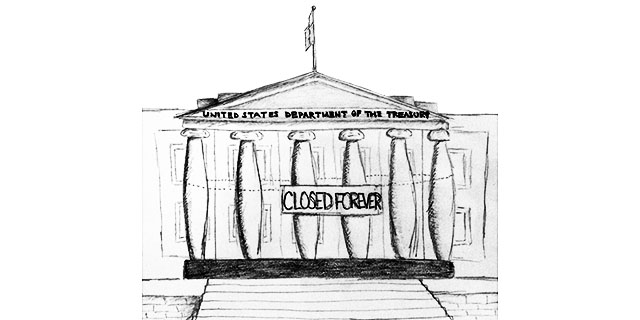
The economy is what makes America great, not the people, but lately our economy has caused us some trouble lately. Like many people, you might find it frustrating to hear on the news that the Dow dropped 600 points, and I’d bet it’s even more frustrating to hear when you have no idea what the Dow dropping points means. It’s annoying to not to be in the know, especially when you can tell that it’s not a good thing because NPR plays “Stormy Weather” when they talk about it. When the economy makes its way into conversations, you probably play it off like small talk.
“Hey, did you hear the Dow dropped a million points?”
“Yeah, the NASDAQ isn’t looking great either.”
“I know, right?”
You probably leave it at that. Although the economy is as useless a conversation starter as the weather, it’s important to understand what is happening with the economy and how to fix its recent shabbiness. I firmly believe that we need to move away from our current economic structure and move towards a barter system. You might think, or hope, that I’m kidding, but after you’re done reading this, you will be convinced that a barter system is absolutely in the best interest of our nation.
So sit down and get comfortable because I’m about to ‘splain you some things.
The first thing to know is that we have a “mixed economy,” which means that our economy combines public (government owned) and private (privately owned) industry. Americans tend to blame banks and Reagan for recent economic disasters. Some “economists” (is that a real, paying job?) like Nobel Laureate Joseph Stiglitz of Columbia University say that the economy crashed in 2007 because of “dishonesty in the finance sector,” but isn’t the entire economy basically a finance sector? There are too many factors that caused the crash to just boil it down to dishonesty. People (read: Democrats) try to make it seem as though all this economic turmoil is due to Reagan’s economic policies, which have been coined “Reaganomics.” President Reagan, the greatest Republican to grace the Oval Office and overlord of the Republican Afterlife, enforced policies that are often associated with “trickle-down economics,” the theory that by giving economic benefits to the wealthiest Americans, society will benefit as a whole, because the money will eventually “trickle down” to lower level earners.
Maybe Reaganomics wasn’t perfect, and maybe it played a small part in a little, really tiny, miniscule fiscal crisis in the 80s (actually it was anything but miniscule), but dips in the economy are common. It doesn’t really matter who we blame for our current economic crisis; all that matters is that we fix what’s been broken.
There is only one way to rebuild the economy, and it’s not by endorsing products made in the U.S. or by creating more consumer demand. Trying to stimulate our economy and getting out of debt are useless endeavors. We shouldn’t even need to have a currency. Moving to a barter system would make the economy so much easier to manage. We could take the economy off the government’s plate (since they have other things to do like argue with each other) and cut spending by no longer needing a treasury. Think about how amazing it would be to pay your Marlborough tuition in Trident Layers. You could do that with a barter system. And think of all the great conversation starters.
“Hey, I noticed you have a new rose gold iPhone 6S.”
“Yeah, it’s pretty great right?”
“I’ll give you ten pairs of Lululemon leggings for it.”
“Sold to the girl with the Lulus!”
You can’t have those kinds of conversations right now because someone would obviously want money in exchange for an iPhone, but what if everything was money? Without a treasury, you would never have to carry around a wallet or worse, a coin-purse. Without a treasury, you would be able to make it rain with anything. We wouldn’t have to carry around green pieces of paper with pictures of old white men or heavy coins that are useless if they aren’t quarters.
You might wonder how the country would be able to go on existing without having a real currency and how taxes might be paid and how banks would be run. A barter system would solve these problems on its own. I know that trade would be a major concern for many people being that the U.S. is a big part of the global economy, but bartering could be done with other countries. Take Iraq; we need their oil. Of course, we would be buying oil from Iraq, but we wouldn’t need to use currency. We could give them celebrities! For some reason, Lionel Richie is hugely successful and famous in Iraq, so we could exchange Lionel Richie for oil. I’m sure he wouldn’t mind.
Sure, it may seem medieval to operate a country like this, but bartering worked really well in the medieval times. There were no crises in the Middle Ages… unless you count the Crisis of the Middle Ages that was so catastrophic it brought on the Renaissance. Ignoring that little blip, the Middle Ages were great, and we could make America that great again. It’s a simple fix, really.









